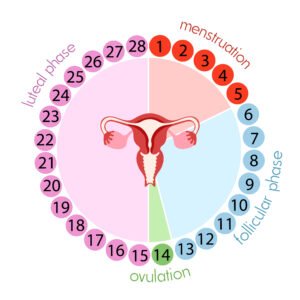Menstrual Irregularities and What They Reveal About Your Health
Periods are often considered a monthly inconvenience, but they’re much more than that. Your menstrual cycle is like a built-in health barometer, reflecting the state of your hormones, lifestyle, and overall well-being. When your periods become unpredictable, heavy, painful, or absent altogether, these menstrual irregularities can act as warning signs that something deeper might be going on.
In this blog, we’ll dive into what irregular cycles mean, the possible causes behind them, and when you should take them seriously. Think of it as a friendly guide to understanding your body better—because your period is trying to tell you something, and it’s worth listening to.
Understanding What Counts as “Normal”
Before we talk about irregularities, it helps to know what a “normal” cycle looks like. A typical menstrual cycle is around 28 days, but anything from 21 to 35 days can be considered normal. The cycle starts on the first day of bleeding and ends the day before your next period begins. Most people bleed for three to seven days.
But here’s the catch: “normal” looks different for everyone. Some women have clockwork-like cycles, while others vary slightly month to month. The real question is: what’s normal for you?
When your usual pattern suddenly changes—whether it’s skipped periods, unusually heavy flow, spotting between cycles, or painful cramps—that’s when we enter the territory of menstrual irregularities.

Types of Menstrual Irregularities
Not all irregularities look the same. Here are the most common patterns:
- Amenorrhea: Missing periods altogether (outside of pregnancy, breastfeeding, or menopause).
- Oligomenorrhea: Infrequent periods, often more than 35 days apart.
- Menorrhagia: Heavy or prolonged bleeding.
- Polymenorrhea: Cycles shorter than 21 days.
- Metrorrhagia: Bleeding between cycles.
- Dysmenorrhea: Painful periods that interfere with daily life.
Each of these can be caused by a range of factors, from lifestyle choices to medical conditions.
What Menstrual Irregularities Might Be Telling You
Your cycle is influenced by a delicate balance of hormones, and when that balance is disrupted, your period often shows it first. Here are some possible messages your body may be sending:
1. Stress is Taking a Toll
Stress—whether physical or emotional can wreak havoc on your cycle. The hormone cortisol, released when you’re under pressure, can interfere with the production of estrogen and progesterone. For some women, this means delayed periods or missed cycles entirely. If your life feels chaotic, your period might reflect that.

2. Weight Fluctuations Matter
Sudden weight loss, extreme dieting, or being underweight can disrupt ovulation. On the other hand, significant weight gain—especially when linked to insulin resistance—can also lead to irregular cycles. Your body uses fat to regulate estrogen, so when that balance shifts, your period often does too.
3. Polycystic Ovary Syndrome (PCOS)
PCOS is one of the most common causes of menstrual irregularities. Women with PCOS often experience skipped periods, excess hair growth, acne, and weight struggles. The underlying issue is usually insulin resistance and hormonal imbalance, which disrupt ovulation.
4. Thyroid Disorders
Your thyroid gland plays a surprisingly big role in your reproductive system. Both hypothyroidism (underactive thyroid) and hyperthyroidism (overactive thyroid) can cause irregular periods. Symptoms like fatigue, weight changes, or hair thinning alongside cycle issues may point to thyroid problems.
5. Uterine or Cervical Issues
Conditions like fibroids, endometriosis, or polyps can lead to heavy bleeding, spotting between cycles, or painful periods. These are structural issues within the reproductive system that often require medical evaluation.

6. Perimenopause
As women approach their 40s, hormone levels begin to fluctuate, leading to unpredictable cycles. Menstrual irregularities are often one of the earliest signs of perimenopause, along with hot flashes, sleep changes, and mood swings.
Lifestyle Factors That Influence Your Cycle
It’s not always a medical condition—sometimes your lifestyle is at the root of the issue.
- Diet: Low-carb or restrictive eating can reduce body fat below healthy levels, disrupting hormones.
- Exercise: Intense training (think marathon runners or gymnasts) sometimes stops periods altogether.
- Sleep: Poor sleep habits mess with melatonin and cortisol, indirectly affecting estrogen and progesterone.
- Alcohol and Smoking: Both are linked to hormone disruption and irregular bleeding.
When to See a Doctor About Menstrual Irregularities
Not every irregularity is cause for alarm. Stressful weeks, travel, or illness can throw off your cycle temporarily. But if you notice patterns that stick around for three months or more, it’s time to seek medical advice.

Some red flags include:
- Periods that suddenly stop without explanation.
- Very heavy bleeding (soaking through pads/tampons every hour).
- Severe cramps that don’t improve with over-the-counter medication.
- Cycles shorter than 21 days or longer than 35 days.
- Bleeding between periods or after sex.
These signs may point to underlying health conditions that need treatment.
How Doctors Typically Diagnose the Cause
If you go to a gynecologist for irregular cycles, here’s what you might expect:
- Medical History: Questions about your lifestyle, stress, and family history.
- Physical Exam: Checking for symptoms like excess hair growth, weight changes, or thyroid enlargement.
- Blood Tests: To measure hormone levels, thyroid function, and blood sugar.
- Ultrasound: To look for PCOS, fibroids, or other structural issues.
Diagnosis is a step-by-step process, often involving ruling out different possibilities before landing on the root cause.
Treatment Options and Lifestyle Adjustments
Treatment depends on the cause, but here are some common approaches:
- For Stress: Stress management, mindfulness, therapy, and better sleep habits.
- For Weight Issues: Nutrition support, balanced exercise, and sometimes medical help.
- For PCOS: Lifestyle changes, medications to regulate hormones, and sometimes fertility treatments.
- For Thyroid Disorders: Medication to balance thyroid hormone levels.
- For Heavy Bleeding: Birth control pills, hormonal IUDs, or surgery in severe cases.
Sometimes, just addressing lifestyle factors—like eating more balanced meals or scaling back on high-intensity workouts—can bring periods back on track.
The Emotional Side of Irregular Periods
Beyond the physical, menstrual irregularities can take an emotional toll. Not knowing when your period will come can be stressful. Dealing with unpredictable bleeding or pain can interfere with your work, relationships, and sense of control. Many women also feel frustrated when doctors dismiss their concerns as “normal.”
It’s important to remember: you are not overreacting. Your cycle is a vital sign, just like your heart rate or blood pressure. If something feels off, it’s worth advocating for yourself.
Natural Ways to Support Your Cycle
While medical intervention may be necessary, there are also gentle, natural approaches that can help regulate your cycle:
- Balanced Nutrition: Eat enough protein, healthy fats, and whole carbs to stabilize hormones.
- Herbal Support: Some women find relief with herbs like chasteberry (vitex) or maca root—but always check with a healthcare provider before trying supplements.
- Exercise in Moderation: Movement is great, but balance is key. Too much intense training can throw hormones off.
- Sleep Hygiene: Aim for 7–9 hours of quality sleep.
- Mind-Body Practices: Yoga, meditation, or journaling to lower stress.

Busting Common Myths Around Periods
- “Irregular periods are always normal in teenagers.”
While cycles can take a couple of years to stabilize after your first period, consistent irregularities may point to PCOS or thyroid issues even in teens. - “Birth control is the only solution.”
Hormonal contraceptives can regulate bleeding, but they don’t always fix the underlying cause. - “Stress can’t stop a period.”
Actually, stress can delay or even stop ovulation. - “You should just put up with pain.”
Severe cramps are not normal. They might signal conditions like endometriosis.
Final Thoughts
Periods may not be everyone’s favorite topic, but they’re one of the most powerful windows into your health. Menstrual irregularities aren’t just inconvenient—they’re clues. By noticing changes, asking questions, and making supportive lifestyle choices, you can uncover what’s really going on with your body.
So the next time your cycle doesn’t show up on schedule—or it feels different than usual—take a step back and listen. Your body is smarter than you think, and it’s always trying to guide you toward balance.


